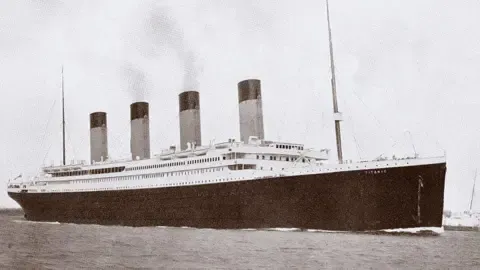8G History Week 19 Assignment
For this week’s assignment, I will be writing about the Titanic.
The RMS Titanic was a luxury passenger ship, built in 1912. It was the largest ship at its time, and it was expected to be unsinkable, due to the “advanced safety features” of the ship. The ship had accommodations for 2,453 passengers.
On April 10, 1912, the Titanic set out on its first voyage. It was captained by Edward John Smith. Many wealthy and famous people were aboard, but there were some third-class passengers, too. The ship made a few stops around Europe, before departing from Queenstown, Ireland, its last stop.
The Titanic’s wireless room, where it received messages from other ships, was receiving many iceberg warnings. Despite this, the Titanic experienced smooth waters. On April 14, the Titanic was getting close to an area of the ocean known to have iceberg problems. The captain steered the ship to try to avoid it. In the wireless room, a message had come in from the Californian, another ship, that they had been trapped by ice, and warned the Titanic to be careful.
The lookouts in the crow’s nest were missing their binoculars, so it would be hard for them to spot anything. They did spot an iceberg around 11:40 P.M., and ordered the ship to be turned. But it was too late. The Titanic’s side had already been punctured by the iceberg. The commander realized that 5 of the ship’s “watertight” compartments had been punctured, and that it would spill over into the others and start sinking the ship. He sent out distress signals to the other nearby boats. The Carpathia responded first, but it was 58 miles away, and it would be a while before it would reach the Titanic. Other ships responded, but were not close enough to help.
The lifeboats began to be launched, with the children and the women taking top priority. Panic broke out, with some of the men fighting over whose family should be allowed to escape. The first lifeboat to leave only had 27 people in it, but its capacity was 65. Water was seen at the bottom of the boat at about 1:00 A.M. The Titanic’s bow was sinking into the ocean, and the other end started poking out of the water. Then the lights went out, and the ship finally sunk down to the sea floor.
The survivors in the lifeboats were rescued by the Carpathia, and it landed in New York City on April 18.
The Titanic was a major tragedy. Many more lives could have been saved if they had enough lifeboats. This was the main problem on the Titanic. The sinking of the Titanic has inspired many books and films. After the Titanic, laws were put into place that stated that all ships must have enough lifeboats for all the passengers and crew.
References:

